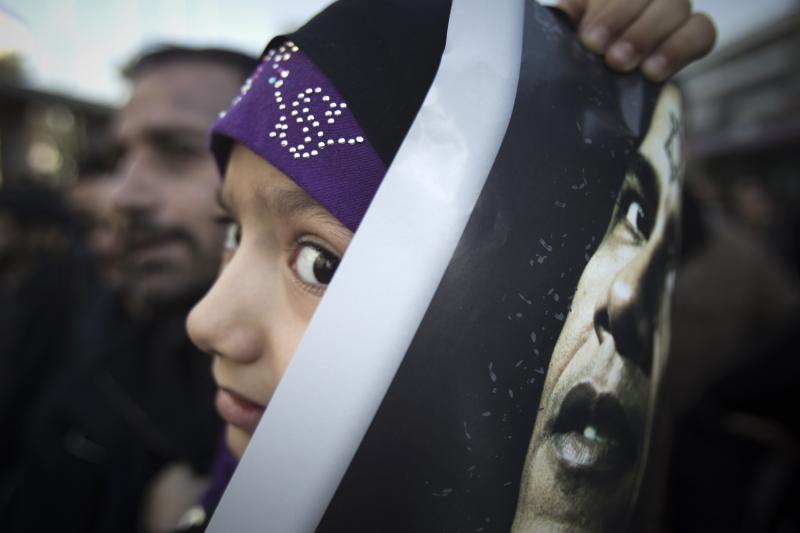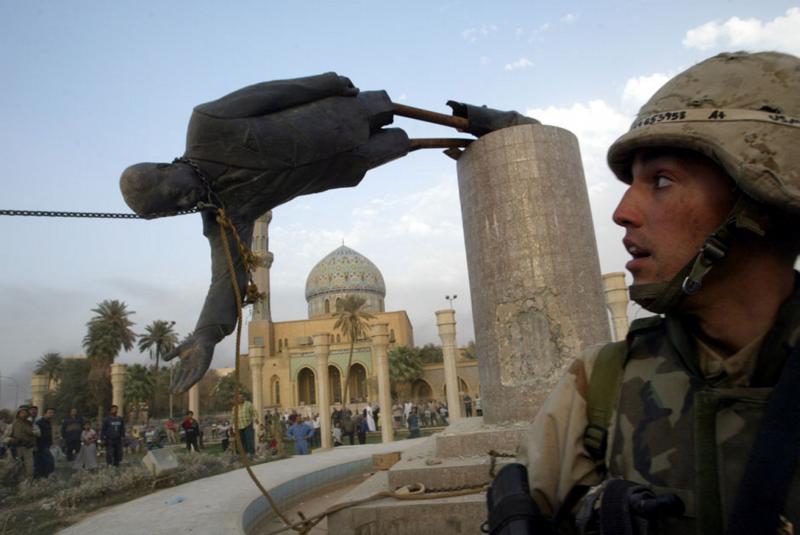PBS: Escaping Eritrea … [Read More...] about ካብ ውሽጢ ቤት ማእሰርታት ኤርትራ
Empire Strikes Back
Imperialism, Past and Present

In 2010, a disturbing report made its entry into an already upsetting news cycle. Members of a U.S. Army brigade, assembled into a self-proclaimed “kill team,” had indiscriminately targeted civilians in southern Afghanistan. As trophies for their deeds, the soldiers collected fingers, leg bones, and skulls from their victims. Photos taken by the soldiers posing next to dead bodies came to light, along with the fact that the main instigator kept tally of each victim by having skulls tattooed on his calf.
Such news reports, a sadly recurring feature of contemporary life, trace a predictable arc. The initial horror quickly subsides in the face of official reassurances and the unrelenting tide of other news. Should the public seek to draw lasting political conclusions from such horrors, it will be predictably reminded that there is only one: that an atavistic darkness has lurked in the hearts of man since the emergence of the species.
Even a cursory reflection on the available facts, however, shows that such atrocities are not aberrations committed in a political vacuum. Calvin Gibbs, the main instigator of the kill team in Afghanistan, bragged about having done the same things during the occupation of Iraq. But collecting the remains of the enemy was also widely practiced by American soldiers during the Vietnam War. And when Gibbs referred to the victims of his grisly deeds as “dirty savages,” he was, consciously or not, tapping into an entrenched history of conquest and occupation.
The horrors of the past live in the horrors of the present, and a responsible engagement with the latter requires an understanding of the former. But if a sense of historical continuity is indispensible in dealing with contemporary problems, it would also be incorrect to paint such continuities with too broad a brush. War and violence have been with us for a long time. But the political and economic parameters through which they are produced and reproduced today are part of a historical epoch of which the present is regrettably still a part: the epoch of imperialism. Indeed, after a long hiatus, when it was seemingly banished to the wilderness of esoteric academic debate, “imperialism” is once again a buzzword, either nervously invoked as an old specter to avoid or embraced as a positive good.
Not surprisingly, the sudden popularity of the term has created great confusion about what it means and why we should care about it. Part of the difficulty is that “imperialism” is used to refer to a hugely diverse range of economic, political, cultural, and linguistic phenomena across centuries and continents. From the Persian empire of antiquity to contemporary American military operations in the Middle East, from China’s economic penetration of Africa to the old Soviet domination of Eastern Europe, every real or perceived form of hierarchy or privilege has been called imperialism. But such broad use of the term deprives it of analytical meaning; that is why it is useful to briefly examine the emergence and evolution of the term itself.
Although “empire” has long historical roots, the term “imperialism” is a relatively recent innovation, making its entrance onto the world stage well into the second half of the nineteenth century. What began as a matter of domestic policy was projected onto the international arena. Initially used to describe the policies of Napoleon III in the 1860s, “imperialism” gradually came to be associated with the new surge of colonial acquisitions by European states. By the 1890s, both supporters and opponents of colonial expansion routinely used the term “imperialism” in their debates over the direction of their societies and, indeed, the world. The term referred to the frenzied struggle that had broken out for a share of the rapidly shrinking pool of territories available for colonial control.
Some observers of the day insisted that, in spite of certain superficial similarities, these were not like the vulgar empires of the past, at least in an economic sense. Men like Cecil Rhodes proudly wore the mantle of “imperialist,” not just because of the immense wealth that was being accumulated in the enterprise but also because imperialism promised a solution to the problem of maintaining social order at home. As Rhodes argued, the only way to deal with a burgeoning working class in England was to ensure high rates of profits that would trickle down to them, as well as to acquire new territories where they could migrate. Moreover, the benefits of imperialism would extend beyond the great unwashed at home by bringing civilization into the farthest and darkest corners of the world.
This happy picture of imperialism didn’t persuade all. The rise of the international socialist movement in particular set the stage for a decisive turn in the way imperialism was understood and used in the broader political discourse. As the great powers of the day hurtled into what would come to be known as the First World War, the Bolshevik leader Vladimir Lenin wrote a short, explosive pamphlet that laid out the origins, the trajectory, and the essentially undemocratic, exploitative nature of imperialism. Building on the work of other writers such as British liberal John Hobson and the Austrian Marxist Rudolf Hilferding, Lenin insisted that imperialism was not just a misguided set of policies with lamentable human consequences but a full-fledged economic and political system on a global scale that had to be confronted as such.
Lenin insisted that imperialism was not just a misguided set of policies with lamentable human consequences but a full-fledged economic and political system on a global scale that had to be confronted as such.
What made Lenin’s argument persuasive was that fact that, in spite of the efforts to present the enterprise as civilizing and mutually beneficial, the reality of life for the vast majority of the colonized populations remained a scathing and irrefutable indictment of imperialism. Moreover, despite their rhetorical commitment to the “right to self-determination,” the victors of the war to end all wars not only divided up the remains of the Ottoman Empire among themselves but also justified their continued right to colonial rule through the mandate system of the new League of Nations. In other words, they maintained the old imperialist reality through new forms, setting the stage for future conflicts.
In this context, the fact that the Bolsheviks not only renounced the territorial acquisitions of tsarist Russia but also publicly disavowed the tsar’s secret treaties with the other powers only strengthened their anti-imperialist credentials. Even in the throes of a struggle for its own survival, the new Soviet government sought to rally anti-imperialist elements from both colonial as well as colonized countries. In 1920, the Soviet government organized the Congress of the Peoples of the East in Baku. The meeting, attended by over 1,800 delegates from Asia and Europe, linked the fate of the Soviet Union to the defeat of imperialism. Later on, even as the political climate in the Soviet Union had changed considerably, leaders from Asia and Africa sought and received the support of the Communist International to create the League Against Imperialism in 1927.
And as the great powers hurtled toward another catastrophic global conflict, the claim that imperialism was in any way beneficial to the colonized became impossible to sustain. The decolonization of the Third World, beginning after World War II, seemed to confirm this prognosis. Yet this process, which in some instances took the form of an orderly transfer of power between governments, posed new questions. On the one hand, the fall of the empires and the formal political independence of the former colonies appeared to be a significant achievement. On the other hand, exploitation, subjugation, and inequality, to say nothing of conflict and war, could hardly be said to have come to an end in the international arena.
The criticism of lingering forms of hierarchy and inequality began to be expressed more in the cultural vein. “Imperialism” gave way to terms such as “Orientalism,” which looked at the historical encounter between the West and the rest of the world through the prism of cultural studies, rather than politics and economics.
Imperialism had, after all, come to be associated with Marxist politics and, by extension, with the Soviet Union, particularly in the Western academy. By the 1970s, although discomfort with capitalism at home and abroad had far from disappeared, leftists no longer took seriously the notion that a new kind of society was being built behind the Iron Curtain. Many were keen to point out that if the term “imperialism” remained useful, it should be applied first and foremost to the relation between the Soviet Union and its satellites. “Imperialism,” as a concept and as shorthand for a certain way to understand the world, was a casualty of this intellectual and political process.

The decline in the usage of the term became precipitous in the aftermath of the collapse of the Soviet Union. The end of the Cold War and the declaration of a “new world order” set the stage for claims about the possibilities, if not yet the actuality, of an epoch that would no longer be governed by competition and conflict among great powers. In lieu of the old paradigms, humanitarianism would finally be allowed to bloom. The developments of the 1990s—the Gulf War, the establishment of the international tribunals for the former Yugoslavia and Rwanda, the interventions in Somalia, Bosnia, Kosovo, the signing of the Rome Statute leading to the institution of the International Criminal Court—were hailed as steps fulfilling the great expectations of this era. By the turn of the century, it appeared as though imperialism (both the term and the phenomenon) was a historical relic.
